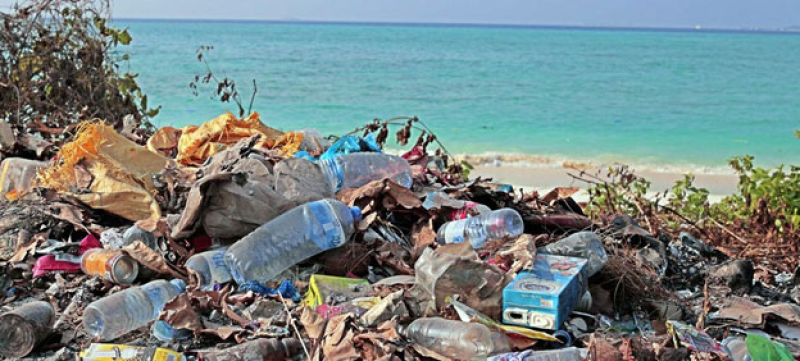- Israeli Aggression against Qatar, Extension of Crimes against Palestine |
- No place is safe in Gaza. No one is safe |
- Stocks fail to recover despite slight gains in Dhaka, Ctg |
- BB Purchases $353m in Dollar Auction to Stabilise Taka |
- Promoting social inclusion of disabled persons thru empowerment |
Plastics Treaty Talks Collapse Amid US, Oil Allies’ Blockade

Plastic waste washes ashore in the Maldives archipelago.
Negotiators in Geneva adjourned what was expected to be the final round of plastics treaty negotiations on Friday without reaching an agreement, a failure that environmentalists blamed on the Trump-led United States, Saudi Arabia, and other powerful nations opposing efforts to curb plastic production—the primary driver of a worsening global pollution crisis.
The Intergovernmental Negotiating Committee (INC) on Plastic Pollution agreed, after 10 days of talks, to resume negotiations at a yet-to-be-announced future date. Fossil fuel lobbyists swarmed the sessions, successfully blocking a binding deal to cut plastic production. More than 99% of plastics are made from fossil fuel chemicals.
“The inability to reach an agreement in Geneva must be a wake-up call for the world: ending plastic pollution means confronting fossil fuel interests head-on,” said Graham Forbes, Greenpeace USA’s Global Plastics Campaign lead.
“The vast majority of governments want a strong agreement, yet a handful of bad actors were allowed to use process to bury ambition. We cannot continue to do the same thing and expect a different result. The time for hesitation is over.”
The high-stakes talks marked the sixth attempt to craft a global plastics treaty as production surges and toxic pollution damages oceans, waterways, and communities worldwide. Talks in December also ended without a deal.
The latest round faltered after nations failed to unite around two draft treaty documents—but for different reasons. Supporters of stronger action, including Fiji, France, and Panama, objected to the absence of binding plastic production cuts, while the US, Saudi Arabia, the UAE, and others opposed the scope of proposals, insisting the treaty should focus mainly on waste management.
A last-ditch proposal on Friday acknowledged that “current levels of production and consumption of plastics are unsustainable,” but still contained no binding limits. Under the current process, every nation must agree to include provisions in the treaty text, giving opponents veto power.
Agnès Pannier-Runacher, France’s minister of ecological transition, expressed fury at the outcome, blaming “a handful of countries” that “blocked the adoption of an ambitious treaty against plastic pollution” for short-term financial gain.
“The scientific and medical evidence is overwhelming: plastic kills. It poisons our oceans, our soils, and ultimately contaminates our bodies,” she said. “France, the EU, and a coalition of over 100 countries did everything possible to secure an agreement to reduce plastic production, ban the most dangerous products, and protect human health.”
David Azoulay, who led the Center for International Environmental Law delegation in Geneva, called the talks “an abject failure” and warned future negotiations would meet the same fate “if the process does not change.”
“We need a restart, not a repeat performance,” Azoulay added. “Countries that want a treaty must now leave this process and form a treaty of the willing—with voting options that break the tyranny of consensus we have seen here.”

